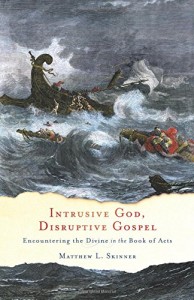Matthew L. Skinner’s Intrusive God, Disruptive Gospel
Here are some extracts from a review that I’ve done of Matthew Skinner’s new book—the full review is forthcoming in Themelios later this year. I’m grateful to the review editor, David Starling, for permission to share these extracts in advance here.
Matthew L. Skinner
Intrusive God, Disruptive Gospel: Encountering the Divine in the Book of Acts
Grand Rapids, MI: Brazos, 2015. xix + 206 pp. £11.22/$16.99
Matthew Skinner has written extensively and intelligently on Acts, and so this new book is to be warmly welcomed. He is Professor of New Testament at Luther Seminary, St Paul, Minnesota and, in addition to his fine scholarly work on Acts (Locating Paul, 2003; The Trial Narratives, 2010; and numerous articles), has contributed extensively to the seminary’s excellent resource www.enterthebible.org, as well as writing for other accessible websites which equip and stimulate those who teach and preach. I mention this because this book is a further fruit of Prof. Skinner’s research put into accessible form for those who may not have technical training in Biblical Studies, but want to dig deeper into the Bible.
In Intrusive God, Disruptive Gospel, Prof. Skinner sets out to read the large majority of Acts in twenty-five short chapters of 5–8 pages. He divides the book into six major sections and provides a brief “Road Map” introducing each section: the section are Acts 1–2; 3–7; 8–12; 13–15; 16–19; 21–28. Throughout his writing is lucid, readable and clear, and sections flow naturally from one to another.
I was conscious, as one who works extensively on Acts myself, in place after place where significant scholarly work and debate underlies Prof. Skinner’s writing (it is acknowledged a little in the “For Further Reading” section at the end). He is judicious and careful in his use of scholarship, and those who have eyes to see will recognise this quickly. Readers may agree or disagree with the exegetical decisions he takes (I found myself agreeing far more than disagreeing), but they will always be informed, educated and stimulated.
This book will be eminently helpful to a church Bible study group working through Acts. It will also inform and help preachers or teachers engaging with Acts, and students who want to see ways in which the book’s themes and issues relate to Christian life and experience today. I commend it very warmly.


One thought on “Matthew L. Skinner’s Intrusive God, Disruptive Gospel”